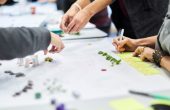On Tuesday I went to the Kering offices to be part of the judging panel for the Kering Award for Sustainable Fashion.
The award was developed at The Centre for Sustainable Fashion at LCF and is part of our five-year partnership to support sustainable design which I spoke about in October.
The award began last October when our students were briefed by representatives from Kering brands: Stella McCartney and Alexander McQueen. The first stage of the competition was open to all final year undergraduates and Masters students at LCF, from which 30 students were selected to engage in a three month mentoring scheme at either McCartney or McQueen – an opportunity to gain insight into the brand and engage with business leaders.
After presentations in April, six students (three for each brand) were selected as finalists for the final mentoring phase from May to June.
On Tuesday I got to see the result of their research, with excellent presentations from all six finalists. What impressed me most about the presentations was the range of different ideas the finalists had conceived. From communication to raw materials, the student’s research covered almost all aspects of the fashion industry, reflecting the complexity of the fashion supply chain.

Ingrid Rautenberg, MA Fashion Futures Image via LCF News
Martin Brambley / BA Menswear identified solutions for integrating waste material into the Alexander McQueen supply chain. Ingrid Rautenberg / MA Fashion Futures, also looked at waste, but from a different perspective – how we can create new forms of “bioplastics” from our food waste to use in accessories and clothes.
Others focussed on new sustainable resources, such as Fiona Fung / MA Fashion Futures who proposed seaweed as a replacement for non-biodegradable synthetics in the creation of thermoplastics, whilst Elena Tarabakina / MA Fashion Artefact looked at replacing leather with wood in her sustainable accessories focus.

Fiona Fung, MA Fashion Futures Image via LCF News
Instead of looking at new materials, Nida Gonul / MA Footwear worked on creating new applications for existing biodegradable material in the manufacturing of shoes and accessories.
Neliana Fuenmayor / MA Fashion Entrepreneurship & Innovation, chose to focus on another aspect of the fashion industry; communication. She argued that Stella McCartney could become “pioneers of transparency” in the fashion world by communicating the stories behind their product, such as how and where it has been made, which can then create better connections between the customer and the company’s brand values.
Seeing such variety of ideas and the breadth of the fashion industry covered by our students was very encouraging.
All the presentations were well researched and delivered excellently, which is very positive to see with pitching becoming more important in the industry. Some were multimedia and others print based, which also reflects fashion’s need for people who are comfortable presenting in a variety of media.
The fact that our students are actually contributing to the way these two British brands are thinking about the environment is brilliant to see. Kering are also influencing our thoughts here at LCF, as they inspire a new approach to our curriculum. This partnership, rooted in recognising sustainability as the creative challenge of our time, is one which both sides are bennefiting from, as we try and shape a better future through fashion.
Find out more…
- Fiona Fung on seaweed in her interview with LCF News
- Ingrid Rautenberg explains her project in an interview with LCF News




